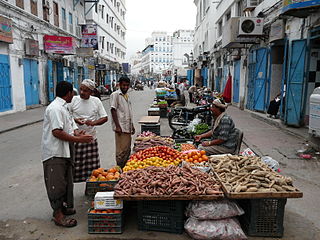 Traders on a street in Mukalla Traders on a street in Mukalla The casualty count varies but one source puts the toll at 35 dead in the Yemeni port city of Mukalla. Another twenty-five people were said to be wounded according to health official, Riad al-Jalili. Mukalla was held for a lengthy period by Al Qaeda in the Arabian Peninsula (AQAM) until a recent offensive by forces loyal to the recognized government of Premier Hadi drove them out in April after AQAM held it for a year. However, the attacks appear to have been launched by the Islamic State indicating their growing strength in Yemen. Mukalla is the capital of the Province of Hadramawt. A report in Al-Arabiya claims that at least 18 people were killed and claims the coordinated attacks were carried out by ISIS or the Islamic State. The attacks took place just as soldiers were about to break their day-long fast during the month of Ramadan. The IS claimed responsibility for the blasts through their on-line news agency Amaq. The first blast was at a checkpoint on the western approaches to Mukalla as the attacker detonated his suicide vest. Another blast was of a bomb-laden car at the military intelligence headquarters. The final blast was from an improvised explosive device that exploded just as the soldiers were to begin their meal. On May 23rd IS launched a suicide attack in the southern port of Aden that killed 40 army recruits. Militant groups have been able to take advantage of the civil war between Houthi rebels and the recognized government which is backed by the Saudis and other Gulf States. The government forces have been able to retake a considerable amount of territory in the south. The capital Sanaa and the north are still held by the Houthis. Al Qaeda in the Arab Peninsula (AQAM) has gained much territory during the civil strife. Yemeni security officials claim that though AQAM and the IS are ideological rivals and compete for fighters there is an overlap between the two groups. A security official said: “Sleeper cells still exist in Mukalla and we are working against them every day. Since the liberation of the city, security forces have arrested hundreds of Al Qaeda fighters in raids, uncovered plots and seized around 20 explosive cars.” According to a report in the Middle East Eye, in one attack the suicide bomber asked soldiers if he could eat with them and then blew himself up. The report gives a higher casualty figure of 42. The governor of Hadramawt Province, Ahmed bin Breyk said: "Mukalla witnessed five suicide attacks in four areas," At first the attacks were said to have killed 17 soldiers plus a woman and a child who were passing by but later the toll was raised to 42. The IS report claimed that 8 of its suicide bombers killed 50 Yemeni security forces. Militants still control several towns in the Wadi Hadramawt valley. The Pentagon admitted last month that a small number of special forces had been involved in the operation to drive Al Qaeda out of Mukalla.
0 Comments
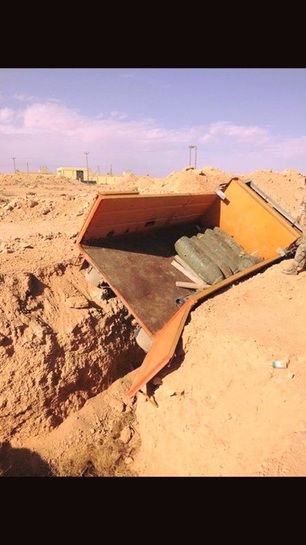 An Islamic State truck bomb gone astray An Islamic State truck bomb gone astray Forces, mostly Misrata militia, loyal to the UN-brokered Libyan Government of National Accord (GNA) have now entered into the city of Sirte, the last city stronghold of the Islamic State in Libya. Apparently many fighters have already left the city. However, there are also unconfirmed reports that Islamic State fighters have also left the town of Harawa on the east to retreat to Sirte. This would allow the advancing Petroleum Facilities Guard (PFG) on the eastern front to advance quite close to Sirte. A tweet said: "Unconfirmed news that #Isis has abandoned Harawa to defend #Sirte. Help in verifying this welcome." Brigadier Gen. Mohammed al-Ghasri, told the Associated Press that a key bridge within the city where extremists used to hang bodies of their enemies has been seized. The forces are only 5 kilometers or 3 miles from the center of Sirte. Al-Ghasri said that fighting on Wednesday killed five of his forces and wounded another 25. An anonymous official said that the advancing forces had met little resistance but there were roadside bombs. There have been air strikes ahead of the advance. An official claimed that the forces were closing in on the Ouagadougou convention center, which is one of the headquarters of the IS. They are also moving towards the port. Earlier, the forces of Solid Structure as they are called took control of the Tagrift military camp south of Sirte. They are also reported to have captured the Al-Jalet military camp and the Au Hadi roundabout which is immediately south of Sirte. Meanwhile, the forces of Khalifa Haftar have yet to engage with those of the Islamic State even though he announced that he was going to march to liberate Sirte about three weeks ago. Instead he is busy attacking the city of Derna in what he calls Operation Volcano. The city is defended by the Shura Council of Derna Jihadists. Haftar insists that they are Al Qaeda although the group denies they have any connections with Al Qaeda. The Council was instrumental in clearing the Islamic State from Derna and the surrounding area. Surprisingly officials from the House of Representatives (HoR) government to whom Haftar is supposedly loyal are operating within the city. Haftar has been bombing the city and the port for days now. The UN doesn't notice apparently. Haftar has refused to join with the central command of the GNA. He rejects the GNA and will not recognize it until it is given a vote of confidence by the HoR. However, every meeting to take a vote has lacked a quorum or has been disrupted. It is not clear when another meeting will happen. 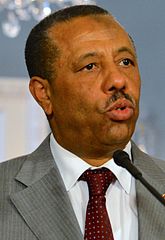 Abdullah Al-Thinni Abdullah Al-Thinni Prime Minister Fayez Serraj of the UN-backed Government of National Accord (GNA) claimed that the government was uniting its various militia and that its own forces would be able to eradicate the Islamic State (IS or ISIS) on its own without the help of foreign troops. While there are a number of militia that for now appear to be loyal to the GNA, the main armed forces of the Libyan National Army associated with Tobruk-based House of Representatives (HoR) headed by Abdullah Al-Thinni, have not united under the GNA central command. The Al-Thinni government does not recognize the GNA. Commander in chief of the Libyan National Army(LNA), Khalifa Haftar, opposes the GNA. He launched his own attack against the Islamic State weeks ago but has yet to have had a single clash with them. Instead the eastern front attacks were launched by his opponents the Petroleum Facilities Guard (PFG) and their head Ibrahim Jodhran. They are advancing towards the town of Harawa only 50 kilometers from Sirte after capturing two towns about 130 kilometers from the IS stronghold. While the forces of the GNA, from what is called the Solid Structure operations room, are cooperating with those of the PFG there is no unified command. While the PFG support the GNA the group is also interested in increased autonomy for the western part of Libya, Cyrenaica. Serraj said that no one, not even General Haftar, would be excluded from the national army as long as he submitted to central authority. Haftar has made it abundantly clear that he has not intention of unifying with the GNA forces until all their militias are disbanded. Many of them he considers his enemies, and the feeling is mutual. In fact the militia who are fighting on the western front from Misrata, Haftar opposes. He is willing to sit back and watch one group of his Islamist enemies fight another group. He is busy attacking another group of Islamists in Derna who had just been instrumental in clearing IS out of the city and surroundings. There is little likelihood that Haftar will be willing to join any unified GNA command. However, it appears that even the forces that are fighting IS now may be capable of defeating them, especially if they receive more weapons and other equipment from the west. Special forces from several countries including the UK are already helping out on the western front against IS. Serraj played down fears that the two competing campaigns would revive conflict between eastern and western factions. The only clash so far was with troops loyal to Haftar and some militia from Misrata near Zillah in the south. However, it remains to be seen if Haftar will stand by while his opponents occupy former IS territory while he will get none of it. Serraj said he had great hope that the two sides will be united but there appears little hope of that happening for the present. He claimed that it was too early to talk about a time frame for the battle of Sirte. However, the battle appears to be well under way. There has been shelling of parts of the city and GNA forces claim to have captured a key airbase near the city. As a recent tweet reports: "#Libya-Capturing Ghardabiya Air Base will enable Misrata to encircle Isia in Sirte, cut off supply and fend off attacks from multiple fronts." The HoR is to be the legislature of the GNA according to the terms of the Libya Political Agreement(LPA). The LPA also requires a vote of confidence in the GNA but that has not yet happened. A number of meetings have been held but have either lacked a quorum or been disrupted. An alleged majority of the HoR have signed a letter saying they support the GNA at least in principle. They want section 8 that gives the job of Khalifa Haftar to the Presidential Council of the GNA to be deleted. It is not clear, how the vote would do anything but transfer conflict to within the GNA government itself. Serraj says he is pushing for a HoR vote perhaps in another city. Kobler had already been trying this. He was planning a meeting in Ghadames but it didn't work out. The UN through the GNA will try to convene all those who want to vote for the GNA apart from opponents and without the blessing of the speaker of the HoR, Ageela Saleh. Serraj said: "I'm trying to stress to them and convince them that they should hold a session in the near future – in any place – just to take their responsibility to make the right decision about many issues." Even if they do finally meet they might not make the "right decision" as Faiez sees it, to approve the GNA. 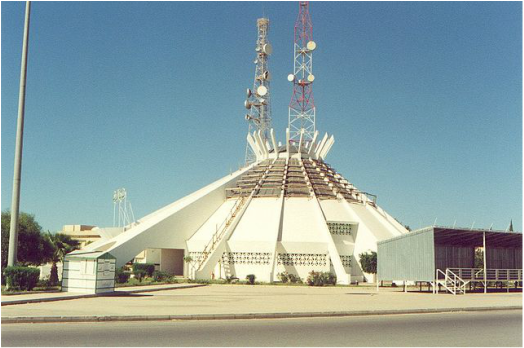 Sirte Assembly Building Sirte Assembly Building Troops loyal to the UN-brokered Government of National Accord(GNA) are advancing further into territory formerly controlled by the Islamic State in Libya (IS). On the western front, troops under the Al-Bunyan Al-Marsoos (Solid Structure) have advanced almost to Sirte and have captured the steam power plant on the outskirts of the city. Troops coming from the south have managed to control Jarif and surrounding area. In Sirte itself, the Islamic State closed down its courts days ago and IS fighters and police vanished from the streets. IS also closed down its radio station. The Solid Structure operations room announced that three of its forces had been killed and 20 injured during recent clashes. A recent tweet claims the city appears virtually empty. Seventy five have been reported killed since the operation against the Islamic State began. IS has mounted a number of suicide attacks using vehicles. On the eastern front, the Petroleum Facilities Guard (PFG) that are allied with the GNA took control of the town of Nawfiliva around 130 kilometers east from the IS stronghold of Sirte. They had captured the town of Ben Jawad further east earlier with the loss of five fighters. No troops were lost in taking Nawfiliva. A new operations room was established in the east to coordinate attacks. The PFG is an opponent of Haftar, the commander of the Libyan National Army (LNA) who does not recognize the GNA. The LNA is the armed forces of the HoR. The Special Representative of the Secretary-General, Martin Kobler, claimed that the various militia in the country must unite in order to defeat the Islamic State or Daesh as he likes to call it. Kobler said at a meeting with French Foreign Minister Jean-Marc Ayrault that a united command structure was needed under the control of Faiez Serraj the PM of the GNA. Kobler said: “One point must be very clear. The fight against Daesh must first be a Libyan fight and a united fight.” He said nobody acting alone will succeed and security actors in the west and east must unite their forces under a joint command structure under the GNA. Ayrault said that the priority was to incorporate General Haftar who heads the LNA with western militias. There is absolutely no sign that this will happen. Haftar has claimed it is unthinkable for him to join GNA forces until all the militias aligned with the GNA were disbanded. This is not likely to happen any time soon since the GNA relies on the militia for security. Kobler said that he has tried to hold talks with Haftar but Haftar refused. The attacks on IS from the east and the west and also the south have greatly reduced the area held by the IS and brought the Misrata militia on the western front to the outskirts of Sirte. It seems quite possible for the Islamic State to be defeated without Haftar agreeing to a unified command under the GNA. Haftar launched his own march towards Sirte weeks ago but for some reason has not attacked them at all. Instead he has launched Operation Volcano against the Shura Council of Derna who were actually instrumental in driving IS out of the city. Kobler's waiting for Haftar to join a unified command makes little sense, when the present forces appear strong enough to defeat IS, especially if the west provides them with more arms and ammunition. Already, UK special forces appear to be helping on the western front.
In spite of the huge ideological difference between Gadaffi's ideology and that of radical jihadists, the Misratans claim that the strength of the Islamic State comes from former Gadaffi loyalists supplemented by former fighters from Syria and Iraq. While this seems paradoxical it would explain how a former Gadaffi stronghold is now held by the very jihadists Gadaffi himself fought against.
Residents of Sirte feel that they gained little from the revolution. Mohammed Ali a student who lived in a suburb now controlled by IS said: "Before the revolution life was so much better. We had electricity, security. Schools were always open,They (Islamic State) are fine. They leave you alone unless you fight them." The vast ideological difference between the Gadaffi regime and IS just does not seem to register in his mind. Some Gadaffi loyalists it would appear are now keen IS fighters just another bizarre feature of the Libyan conflict. Sources: http://abcnews.go.com/International/wireStory/militias-islamic-state-extremists-clash-central-libya-31182019 http://www.reuters.com/article/2015/05/21/us-libya-security-insight-idUSKBN0O610M20150521 http://news.yahoo.com/gaddafis-home-town-falls-islamic-state-anarchic-libya-094455638.html |
Like this writer's work please donate:
Ken Hanly
Ken is a retired philosophy professor living in the boondocks of Manitoba, Canada, with his Filipina wife. He enjoys reading the news and writing articles. Politically Ken is on the far left of the political spectrum on many issues.
Archives
November 2016
Categories
All
|
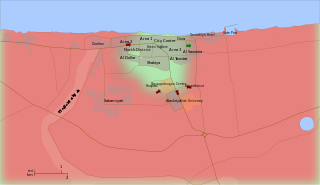
 RSS Feed
RSS Feed

